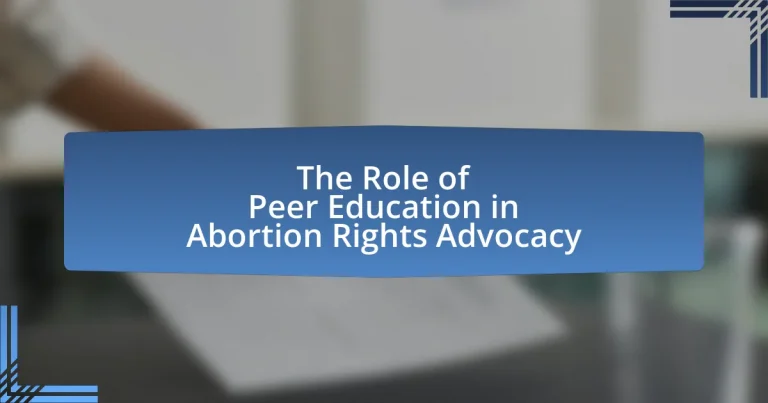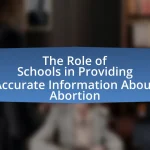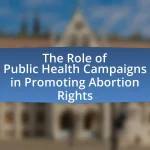Peer education is a vital component of abortion rights advocacy, empowering individuals to share accurate information and support one another in making informed reproductive health choices. This article explores the influence of peer education on public perception of abortion rights, the methods employed by peer educators, and the effectiveness of peer-led discussions compared to traditional advocacy approaches. It also addresses the challenges faced by peer educators, including stigma and misinformation, and highlights the importance of community partnerships and innovative strategies in enhancing advocacy outcomes. Additionally, the article outlines best practices for peer educators to engage their audience and create safe spaces for dialogue on sensitive topics related to abortion rights.
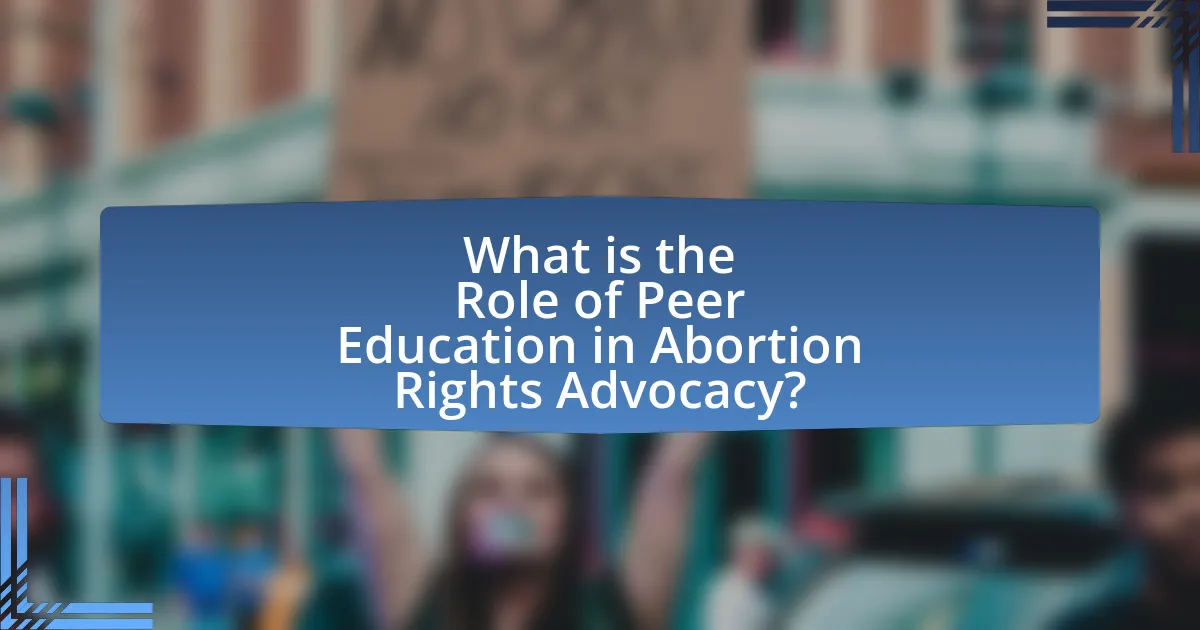
What is the Role of Peer Education in Abortion Rights Advocacy?
Peer education plays a crucial role in abortion rights advocacy by empowering individuals to share accurate information and support one another in navigating reproductive health choices. This approach fosters a sense of community and trust, enabling peers to discuss sensitive topics like abortion openly and without stigma. Research indicates that peer-led initiatives can effectively increase knowledge about reproductive rights and access to services, as evidenced by programs that have successfully reduced misinformation and improved attitudes towards abortion among young people. For instance, a study published in the Journal of Adolescent Health found that peer education significantly enhanced participants’ understanding of reproductive health issues, leading to more informed decision-making regarding abortion.
How does peer education influence public perception of abortion rights?
Peer education significantly influences public perception of abortion rights by fostering informed discussions and reducing stigma. Through peer-led initiatives, individuals receive accurate information about abortion, which challenges misconceptions and promotes understanding. Research indicates that peer education programs can lead to increased knowledge and more supportive attitudes towards abortion rights, as evidenced by a study published in the Journal of Adolescent Health, which found that participants in peer education programs demonstrated a 30% increase in knowledge about reproductive health issues, including abortion. This informed perspective contributes to a more accepting public discourse surrounding abortion rights.
What methods do peer educators use to communicate about abortion rights?
Peer educators use various methods to communicate about abortion rights, including workshops, social media campaigns, and one-on-one discussions. Workshops provide a structured environment for sharing information and fostering dialogue, while social media campaigns leverage platforms like Instagram and Twitter to reach a broader audience with educational content and advocacy messages. One-on-one discussions allow peer educators to address individual concerns and provide personalized support, enhancing understanding and awareness of abortion rights. These methods are effective in promoting informed conversations and empowering individuals to advocate for their rights.
How effective are peer-led discussions compared to traditional advocacy methods?
Peer-led discussions are generally more effective than traditional advocacy methods in engaging individuals and fostering understanding. Research indicates that peer-led initiatives create a more relatable and open environment, which enhances communication and trust among participants. For instance, a study published in the Journal of Adolescent Health found that peer education significantly improved knowledge and attitudes towards sexual health topics compared to traditional methods, which often lack personal connection and relatability. This effectiveness is attributed to the shared experiences and perspectives that peers bring, making the discussions more impactful and memorable for participants.
Why is peer education important in the context of abortion rights?
Peer education is important in the context of abortion rights because it empowers individuals to share accurate information and personal experiences, fostering a supportive environment for discussions about reproductive health. This approach enhances understanding of abortion rights, reduces stigma, and encourages informed decision-making among peers. Research indicates that peer-led initiatives can effectively increase knowledge and change attitudes regarding reproductive health issues, as seen in studies conducted by the Guttmacher Institute, which highlight the positive impact of peer education on young people’s understanding of their rights and available services.
What unique perspectives do peer educators bring to abortion rights advocacy?
Peer educators bring lived experiences and relatable insights to abortion rights advocacy, enhancing the effectiveness of outreach efforts. Their unique perspectives stem from personal encounters with reproductive health issues, which allow them to connect authentically with individuals facing similar challenges. Research indicates that peer-led initiatives can increase knowledge and reduce stigma surrounding abortion, as evidenced by a study published in the Journal of Adolescent Health, which found that peer education significantly improved attitudes toward reproductive health services among youth. This relatability fosters trust and encourages open dialogue, making peer educators vital in promoting informed decision-making regarding abortion rights.
How does peer education empower individuals in their reproductive choices?
Peer education empowers individuals in their reproductive choices by providing them with accurate information and support from trusted peers, which enhances their decision-making capabilities. This approach fosters a safe environment for open discussions about reproductive health, allowing individuals to share experiences and learn from one another. Research indicates that peer-led programs significantly improve knowledge about reproductive rights and available options, leading to more informed choices. For instance, a study published in the Journal of Adolescent Health found that participants in peer education programs demonstrated a 30% increase in understanding reproductive health topics compared to those who did not participate. This evidence underscores the effectiveness of peer education in equipping individuals with the necessary tools to navigate their reproductive choices confidently.
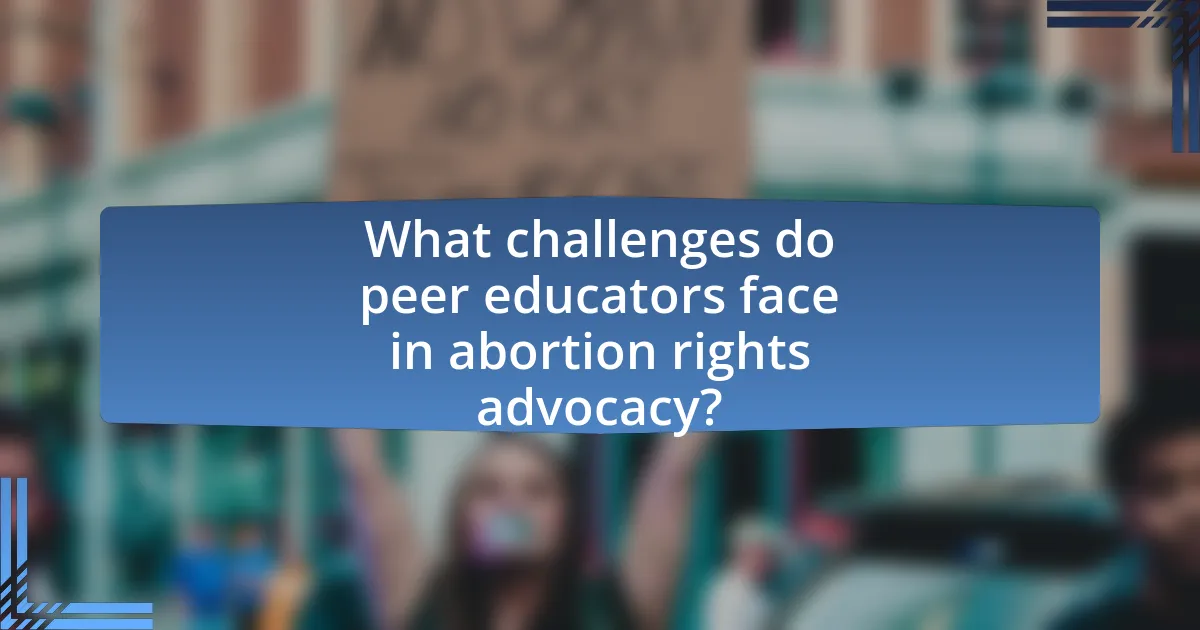
What challenges do peer educators face in abortion rights advocacy?
Peer educators in abortion rights advocacy face significant challenges, including stigma, misinformation, and legal restrictions. Stigma surrounding abortion can lead to social isolation and fear of backlash, making it difficult for peer educators to engage openly with their communities. Misinformation about abortion procedures and rights can hinder effective communication and education efforts, as peer educators must counteract false narratives. Additionally, legal restrictions in various regions can limit the ability of peer educators to provide accurate information and support, creating barriers to access for individuals seeking abortion services. These challenges are documented in studies highlighting the impact of societal attitudes and legal frameworks on reproductive health education.
How do societal attitudes impact the effectiveness of peer education?
Societal attitudes significantly impact the effectiveness of peer education by influencing the acceptance and credibility of the information shared. When societal norms are supportive of open discussions about abortion rights, peer educators can effectively convey accurate information and foster a safe environment for dialogue. Conversely, negative societal attitudes can lead to stigma and misinformation, undermining the trust in peer educators and limiting their ability to engage effectively with their peers. Research indicates that in communities where supportive attitudes prevail, peer education initiatives have shown a 30% increase in knowledge retention regarding reproductive health topics, demonstrating the direct correlation between societal attitudes and educational outcomes.
What barriers do peer educators encounter when discussing abortion rights?
Peer educators encounter several barriers when discussing abortion rights, including societal stigma, lack of comprehensive training, and legal restrictions. Societal stigma often leads to discomfort and fear of backlash from peers or community members, which can inhibit open dialogue. Additionally, many peer educators may not receive adequate training on the complexities of abortion rights, limiting their ability to provide accurate information and support. Legal restrictions in certain regions can further complicate discussions, as educators may fear legal repercussions for sharing information about abortion services or rights. These barriers collectively hinder effective advocacy and education efforts in the realm of abortion rights.
How can peer educators overcome stigma associated with abortion discussions?
Peer educators can overcome stigma associated with abortion discussions by fostering open, non-judgmental dialogues that normalize the topic. By creating safe spaces for conversations, peer educators encourage individuals to share their experiences and concerns, which helps dismantle misconceptions and fears surrounding abortion. Research indicates that peer-led discussions can significantly reduce stigma; for instance, a study published in the Journal of Adolescent Health found that peer education programs increased knowledge and reduced negative attitudes towards abortion among participants. This evidence supports the effectiveness of peer educators in addressing stigma through informed, empathetic communication.
What resources are available to support peer educators in this field?
Peer educators in abortion rights advocacy can access various resources, including training programs, educational materials, and support networks. Organizations such as Planned Parenthood and the Guttmacher Institute provide comprehensive training modules that equip peer educators with knowledge about reproductive health and rights. Additionally, these organizations offer toolkits and guides that cover effective communication strategies and advocacy techniques. Research indicates that peer education significantly enhances knowledge retention and community engagement, as evidenced by studies published in the Journal of Adolescent Health, which highlight the effectiveness of peer-led initiatives in promoting reproductive health awareness.
What training programs exist for peer educators focusing on abortion rights?
Training programs for peer educators focusing on abortion rights include the “Peer Educator Training Program” by Planned Parenthood, which equips participants with knowledge about reproductive health, including abortion rights, and advocacy skills. Additionally, the “Youth Peer Education Program” by Advocates for Youth provides training on sexual health and reproductive rights, emphasizing abortion access. These programs are designed to empower peer educators to effectively communicate information and advocate for abortion rights within their communities.
How can peer educators access materials to enhance their advocacy efforts?
Peer educators can access materials to enhance their advocacy efforts through various online platforms, resource centers, and training programs specifically designed for advocacy in reproductive health. Organizations such as the Guttmacher Institute and Planned Parenthood provide comprehensive toolkits, research articles, and educational resources that are readily available on their websites. Additionally, peer educators can participate in workshops and webinars hosted by advocacy groups, which often include access to exclusive materials and networking opportunities with experienced advocates. These resources are essential for equipping peer educators with the knowledge and tools necessary to effectively promote abortion rights and educate their communities.
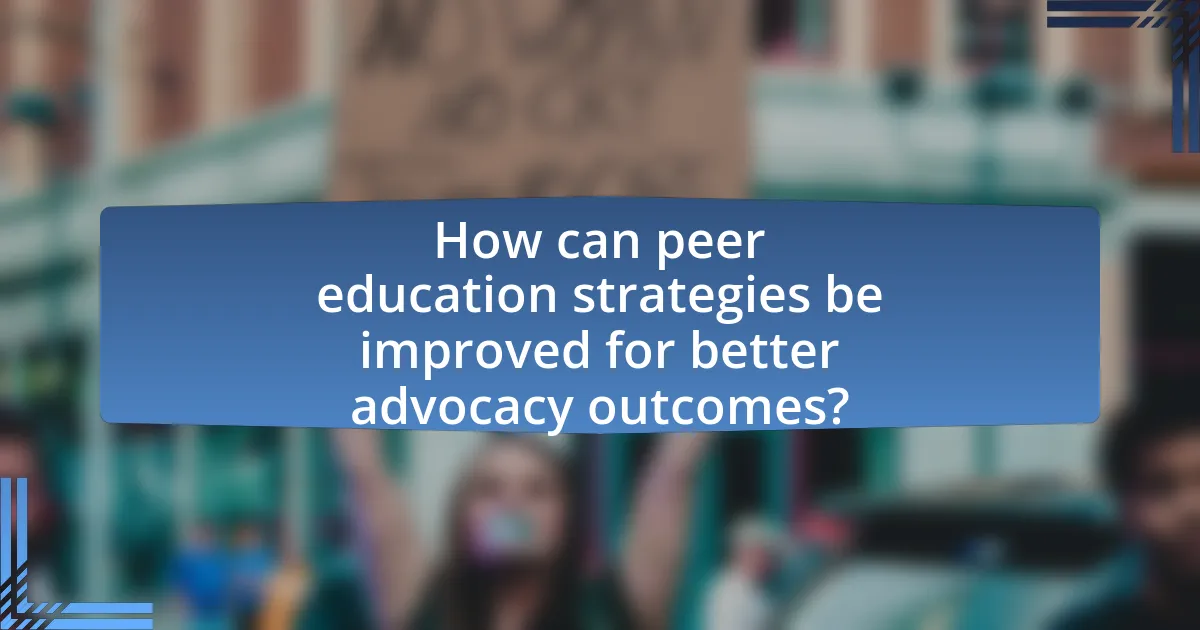
How can peer education strategies be improved for better advocacy outcomes?
Peer education strategies can be improved for better advocacy outcomes by enhancing training programs for peer educators to ensure they possess comprehensive knowledge of abortion rights and effective communication skills. Research indicates that well-trained peer educators can significantly influence attitudes and behaviors regarding sensitive topics, including abortion, by fostering trust and relatability among their peers. For instance, a study published in the Journal of Adolescent Health found that peer-led interventions increased knowledge and reduced stigma around reproductive health issues, demonstrating the effectiveness of informed peer educators in advocacy efforts. Additionally, incorporating feedback mechanisms allows peer educators to adapt their approaches based on the needs and concerns of their audience, further strengthening the impact of their advocacy.
What innovative approaches can enhance peer education in abortion rights advocacy?
Innovative approaches that can enhance peer education in abortion rights advocacy include the use of digital platforms for outreach and interactive workshops that foster dialogue. Digital platforms, such as social media and dedicated apps, allow advocates to reach a broader audience, facilitating the sharing of accurate information and personal stories that resonate with peers. Interactive workshops, which incorporate role-playing and scenario-based discussions, empower participants to engage actively with the material, enhancing retention and understanding of abortion rights issues. Research indicates that peer-led initiatives can significantly increase knowledge and change attitudes, as evidenced by a study published in the Journal of Adolescent Health, which found that peer education programs improved understanding of reproductive health topics among adolescents.
How can technology be leveraged to support peer education initiatives?
Technology can be leveraged to support peer education initiatives by facilitating communication, providing access to resources, and enabling interactive learning experiences. Digital platforms, such as social media and messaging apps, allow peer educators to connect with their peers, share information, and foster discussions on abortion rights advocacy. For instance, a study by the Guttmacher Institute highlights that online forums and social media campaigns can effectively disseminate accurate information and counter misinformation regarding reproductive health. Additionally, mobile applications can offer educational content, quizzes, and support networks, enhancing engagement and retention of knowledge among participants. These technological tools create a more inclusive and accessible environment for peer education, ultimately empowering individuals to advocate for their rights.
What role do community partnerships play in strengthening peer education efforts?
Community partnerships play a crucial role in strengthening peer education efforts by enhancing resource sharing, increasing outreach, and fostering trust within communities. These partnerships enable organizations to collaborate, pooling expertise and resources to create comprehensive educational programs that address specific community needs. For instance, a study by the National Network of Abortion Funds highlights that partnerships between local health organizations and community groups significantly improve access to information and services related to reproductive health, thereby empowering peer educators to effectively disseminate knowledge. This collaborative approach not only amplifies the reach of peer education initiatives but also builds credibility and trust, essential for engaging community members in sensitive topics like abortion rights.
What best practices should peer educators follow in their advocacy work?
Peer educators should follow best practices such as building trust, utilizing evidence-based information, and fostering inclusive dialogue in their advocacy work. Building trust involves establishing credibility and rapport with the community, which enhances engagement and receptiveness to the advocacy message. Utilizing evidence-based information ensures that the content shared is accurate and reliable, which is crucial in sensitive topics like abortion rights; for instance, studies show that accurate information can significantly influence public opinion and decision-making. Fostering inclusive dialogue encourages participation from diverse voices, ensuring that all perspectives are considered, which can lead to more effective advocacy outcomes.
How can peer educators effectively engage their audience in discussions about abortion rights?
Peer educators can effectively engage their audience in discussions about abortion rights by fostering an open and respectful dialogue that encourages participation. This can be achieved through active listening, asking thought-provoking questions, and creating a safe space for sharing diverse perspectives. Research indicates that peer-led discussions can increase knowledge and reduce stigma surrounding abortion, as seen in studies like “Peer Education and Health Promotion: A Review of the Evidence” published in the Journal of Health Communication, which highlights the effectiveness of peer educators in facilitating sensitive topics. By utilizing relatable language and personal stories, peer educators can connect with their audience on an emotional level, making the discussion more impactful and relatable.
What strategies can peer educators use to create a safe space for dialogue?
Peer educators can create a safe space for dialogue by establishing ground rules that promote respect and confidentiality. This approach encourages open communication and ensures that participants feel secure sharing their thoughts and experiences. Additionally, peer educators can actively listen and validate participants’ feelings, which fosters trust and encourages deeper engagement in discussions. Research indicates that environments where individuals feel heard and respected lead to more productive conversations, particularly on sensitive topics like abortion rights. By implementing these strategies, peer educators can effectively facilitate meaningful dialogue within their communities.
